
Women and Political Governance in Africa: A Feminist Perspective
This study seeks to examine and analyze the different ways in which African women leaders in their respective capacities in civil society, political parties and in government/State institutions h…
- ISBN/ISSN
- -
- Number of Pages
- -

BIRTHING LEADERS: STORIES OF CHANGE IN AFRICAN WOMEN'S ORGANISATIONS
he Leadership and Governance programme is based on our knowledge of the persistent challenges of African women’s organisations with issues related to resource mobilisation, communications, govern…
- ISBN/ISSN
- -
- Number of Pages
- -
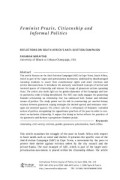
Feminist Praxis, Citizenship and Informal Politics: Reflections on South Afri…
This article focuses on the Anti-Eviction Campaign (AEC) in Cape Town, South Africa, which is part of the larger anti-privatization movement, mobilized by disadvantaged township residents to asse…
- ISBN/ISSN
- 1461-6742
- Number of Pages
- -
Leading For Peace Building Human Security
Isis-WICCE has trained about one thousand two hundred women from twenty nine countries. Utilizing this number the organization continues to facilitate and strengthen the activities of the trained w…
- ISBN/ISSN
- 9.78997E+12
- Number of Pages
- -
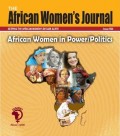
The African Women's Journal: African Women in Power/Politics
This issue of the African Women's Journal explores both the individual and collective experiences of the past, aspiring or current women in power/politics. The articles speak to some of the persist…
- ISBN/ISSN
- -
- Number of Pages
- -
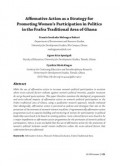
Affirmative Action as a Strategy for Promoting Women’s Participation in Pol…
While the use of affirmative action to increase women’s political participation in societies where socio-cultural factors militate against women’s political interests, popular measures do not g…
- ISBN/ISSN
- -
- Number of Pages
- -

The myth and reality of women in politics: A discourse of the core issues
This paper examines the myth and reality of Women in politics and the attendant core issues. In the process, the historical dimension and/or, backdrop of Women’s political actions and inactions w…
- ISBN/ISSN
- 2516-9831
- Number of Pages
- -

When I dare to be powerful": On the Road to a Sexual Rights Movement in East …
This publication breaks the silence regarding women's sexuality. Governments, women's rights activists and other social movements, often fail to understand the connection between sex work, forced e…
- ISBN/ISSN
- -
- Number of Pages
- -
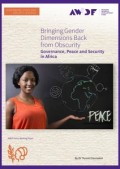
Bringing Gender Dimensions Back from Obscurity: Governance, Peace and Securit…
This publication makes a set of observations which, in part, explain the absence of a qualitative shift towards gender equality in these fields. it also offers some proposals for relocating gender …
- ISBN/ISSN
- -
- Number of Pages
- -
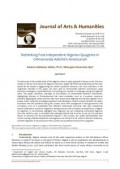
Rethinking Post-Independent Nigerian Quagmire in Chimamanda Adichie’s Ameri…
The discourse of the wobbly state of the Nigerian nation is aptly captured in literary works. Previous studies on literary texts about the Nigerian state have largely identified bad leadership and …
- ISBN/ISSN
- 2167-9053
- Number of Pages
- -
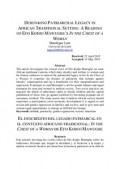
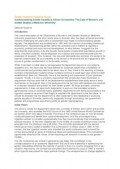

 Agriculture and Environmental Studies
Agriculture and Environmental Studies  Arts, Media and Popular Culture
Arts, Media and Popular Culture  AWDF Publications
AWDF Publications  Capacity Building
Capacity Building  Children Human Rights
Children Human Rights  Climate Change
Climate Change  Development Studies
Development Studies  Disability Rights & Disability Studies
Disability Rights & Disability Studies  Economic Empowerment and Livelihood
Economic Empowerment and Livelihood  Feminist Studies
Feminist Studies